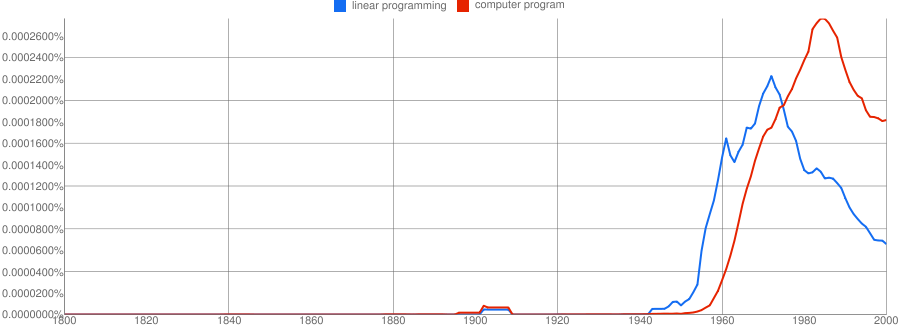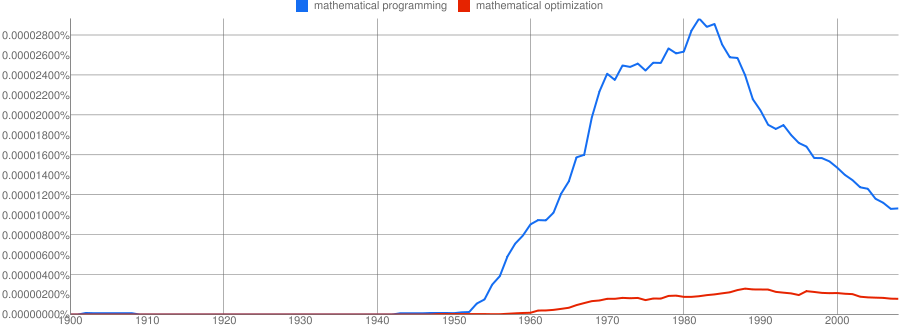Renaming is a powerful way to show change. Recently, I came across two colleagues who changed names. Once did the equivalent of changing names from Michael to Michelle, signifying some very significant life changes. The other went from a name like John Smith to Luigi Backtrend (real names changed to protect the innocent!), wanting to make himself more unique and visible to online searches. Name changes like this can affect a life and career: no one listened to the song stylings of Arnold Dorsey until he became Englebert Humperdinck, and Marion Morrison could not possibly be the hero of a western, but he could, renamed as John Wayne.
Somehow I completely missed the changes that the Mathematical Programming Society has undergone in this regard. Last year, the forty-year-old MPS became the Mathematical Optimization Society. At an age when many men are buying sports cars and experimenting with extramarital affairs, the MPS decided a name change would scratch its mid-life crisis itch.
While I am not enthusiastic about the change, I am sympathetic to the need. The word “programming” in mathematical programming (and linear programming, integer programming, dynamic programming and so on) does not match up with the current use of “programming” to mean, almost exclusively, the programming of computers. Back in the 40s and 50s, “programming” could be used for any sort of planning, so “linear programming” made sense: it was a method for determining (planning or programming) the maximum of a linear function over linear constraints. The word “program” is still used in many contexts (“television program”, “conference program”, and so on) but in much of our world, “program” now means one thing: a computer program. So the meaning of “linear programming” is no longer self-evident. “Mathematical programming” could now be misinterpreted as creating computer programs for mathematics, which is not quite what the field defines it as.
 The diagram shows how often the phrases “linear programming” and “computer program” appear in books, through the Google Books ngram system. I am surprised that linear programming does that well (and it dominates “computer programming”): it is a term with a great history. But “computer program” is certainly more common these days, and I suspect there are many, many instances where program is used without a qualifier to mean “computer program”.
The diagram shows how often the phrases “linear programming” and “computer program” appear in books, through the Google Books ngram system. I am surprised that linear programming does that well (and it dominates “computer programming”): it is a term with a great history. But “computer program” is certainly more common these days, and I suspect there are many, many instances where program is used without a qualifier to mean “computer program”.
“Optimization” has, at least so far, kept a meaning of “finding the best value”, though I hear my students (and researchers in meta-heuristics) refer to “more optimal” solutions so often that I fear it too is losing its  meaning. So “Mathematical Optimization” is a bit more self-evident. It is, however, not a term that has been used a lot. The same ngram system does not show anywhere near as much use of “mathematical optimization” as “mathematical programming”. And while the ngrams are only for books, Google search shows a five to one advantage for “mathematical programming” over “mathematical optimization”, while the ratio is twenty to one in Google Scholar.
meaning. So “Mathematical Optimization” is a bit more self-evident. It is, however, not a term that has been used a lot. The same ngram system does not show anywhere near as much use of “mathematical optimization” as “mathematical programming”. And while the ngrams are only for books, Google search shows a five to one advantage for “mathematical programming” over “mathematical optimization”, while the ratio is twenty to one in Google Scholar.
But even our field did not uniformly adopt “programming” over “optimization”. It is, after all “combinatorial optimization” not “combinatorial programming”. So there is some historical precedent for the use of “optimization”.
While I hate the idea of downgrading the word “programming” in our field (it is not just “computer programming”!), I understand why MPS/MOS decided to be proactive on this front. And I appreciate they way they did it quickly, seemingly without the endless hand-wringing of those of us in operations research/management science/decision optimization/prescriptive analytics/advanced business analytics. There may come a day when the Institute for Operations Research and the Management Sciences (INFORMS) changes its name: I can’t believe it will be done as easily as MPS/MOS has done it.
Is this name change going to confuse people who work in optimal control theory or calculus of variations? Both are clearly mathematical, the first is clearly optimization and the second certainly can be.
And what about the people who code solvers? Do they now work in
“mathematical optimization programming”? Are they exiled from MOS meetings since they are in the P branch? (Note to other commenters: Please withhold any P equals/does not equal NP gags here.)
There is a journal from the society call Mathematical Programming Computation. Perhaps it should be renamed simply “Mathematical Programming” or perhaps “Mathematical Optimization Programming”. I don’t think “Mathematical Optimization Programming Computation” will clarify the situation.
Didn’t realize/notice it either (despite the fact that I’m subscribed to Optimization Online and being an occasional reader of the Optima newsletter). And although there has been a “quite” strong mandate pro name change, isn’t the real question: Who (still) cares? 622 people? Maybe _that_ is the real problem.
Ironic that Optimization Online has not picked up the change of name of its sponsor.
I too fear that “Optimization” as a standalone word has been abused (alongside “Analytics”), and has lost most meaning in popular business speak. “Mathematical Optimization” is a less threatened species.
Optimization Online has fixed the name, but it’s still using the old logo.
The Mathematical Optimization Society will soon have a new logo.